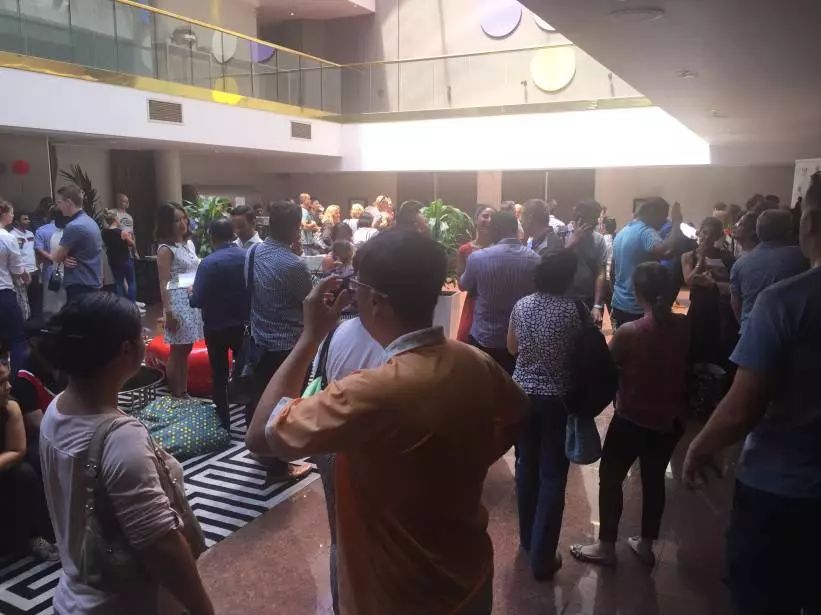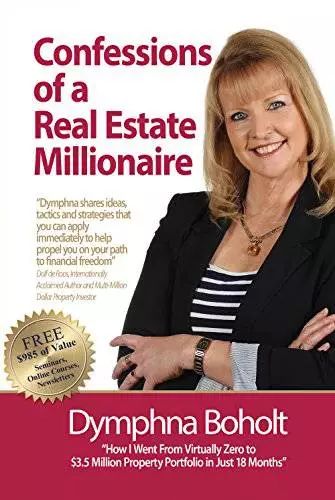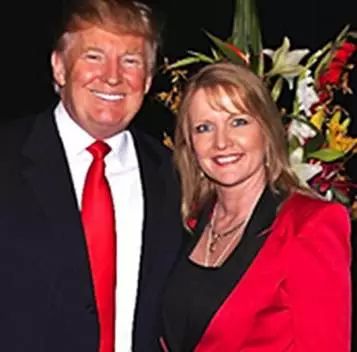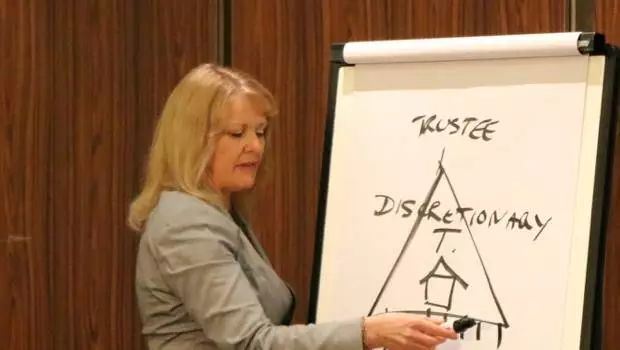From single mothers to tens of millions of worth: an in-depth interpretation of the Australian property godfather investment path
I attended a “I Love Realestate” lecture by famous Australian bestseller, senior real estate investor and wealth creation educator Ms. Dymphna Boholt. During this intensive course of nearly 9 hours a day, Dymphna provided a comprehensive analysis of her personal investment experience, real estate investment experience and her views on the current market to the audience.
For most of my friends who used to talk about Chinese real estate lectures, I think listening to the lecture of real estate investors in West China has many benefits for every investor in developing new ideas and learning new knowledge.
Lectures about the day attracted about 400 people to the scene, China faces less than 10%
Dymphna gave the spectators who attended the lecture a free biography of her own investment experience entitled “Confessions of a Real Estate Millionaire”, and spent the whole of the book on these two days Tail carefully read it again. This book describes in great detail how Dymphna went from being a “destitute” single mother to the mentality of “godfather” today: from zero assets to having a 350 Million Australian real estate portfolio.
More importantly, she also elaborated on the investment philosophy and investment strategy belonging to Dymphna, and many of the contents and opinions in the book are probably very “ruined” for Chinese buyers who only know to buy and buy.
Today’s article, I will summarize for everyone the best part of this book and lecture, please be prepared to take a look at the real estate investment of middle-aged and white women born in rural Australia.
1, who is Dymphna Boholt?
Dymphna was born in a small town in Queensland. After graduating from college, she came to work in Sydney and has long been in the accounting profession (yes, not only Chinese students attend accounting). She is an Australian Certified Public Accountant CPA.
When Dymphna divorced her first husband in 1994, she found her life plummeting into a downturn: she had no money under her name but was pregnant again and had a baby to be fed.
Back in Dymphna, Queensland, began the “tragic life” of a single mother. She re-employed, opened up a personal accounting firm business, livelihood is not difficult, but found himself simply do not have time to enjoy life, work 50-60 hours a week overwhelmed her. When Dymphna wanted to buy an office chair for her office, she found she wanted to buy one of the most expensive careers in the market because she felt likely to be working with the office in the next two decades or even three decades The chairs passed together.
Twenty years, work 9-10 hours a day, get along with the same desk and chair, do your own life will have to spend it? Dymphna was horrified by this idea, and she decided not to succumb to her destiny, to find a way out and to change the status quo. Dymphna has a clear goal: to find a way to have enough passive income to replace her current accounting income. Thus, investing in real estate that gives her a positive cash flow is Dymphna’s investment philosophy.
2, Dymphna’s investment path
Prior to formally investing, Dymphna spent nearly six months doing a series of preparatory work: including a reasonable tax return to protect their ability to lend; pay off all consumer loans such as car loans, credit card arrears; will be from the housing The loan is split into two parts, the Standalone structure we talked about earlier. From here I can see some of the differences between her and most investors.
A detailed explanation of the structure of Standalone please stamp the previous column: Australia House gossip 01 | Your loan structure is there any problem? (Original platform)
After some research and search, Dymphna found her first investment bid: Duplex in a seaside town of 25,000 with a price of 130,000. After some calculations, Dymphna confirmed that after deducting all of the cost of housing, insurance, lending rates, this property will be able to bring her about 4000 Australian dollars a year in revenue.
The first real estate cash flow:
Investment: 130,000
Annual rent: 14,040 (135 / week / set)
Municipal fee: 2,500
Interest: 7,280
Net annual revenue: 4,260
Four thousand dollars a year, although not many, but Dymphna never need to worry about the money, this feeling is really good. Follow this line of thought, she found several similar investment property.
Since then, Dymphna has accumulated three sets of investment properties, these properties have a total of five units available for rent, a year can give her a total of about 10,000 Australian dollars in revenue.
However, Dymphna soon encountered a bottleneck. As she continues to buy assets, she encounters the hassle of all property investors having a headache: no money. For further investment, Dymphna must either think of a way to earn a cash flow or get Equity out of the property. The first thing she came up with was to renovate her home-from-home to get more Equity out of the bank.
After nearly six months of “arduous combat,” Dymphna spent $ 44,000 to renovate her home, work wasted effortlessly, and her six months of hard work brought her an estimated $ 90,000 increase in bank valuations, although almost half She and her new husband Brian did her best, but the good news was that she could buy it again.
In this way, Dymphna continues to capitalize on her own real estate portfolio by constantly recycling Cash Cow properties that generate positive cash flow, and buying Chunk Deal, a value-addable refinancier. Today, apart from buying properties, she also set up her own real estate investment education company. Every year in Australia, she has a large number of people who spend a lot of money on tuition and education in Dymphna’s real estate education. A successful business story from single mom to real estate “The Godfather” was written.
Dymphna with U.S. President Donald Trump
3, deconstruct the investment standard of Dymphna Boholt
Read Dymphna Boholt’s life experience, I think many people envy envy it. Yes, who do not want to have a bunch of real estate that can bring passive income to yourself? However, behind any successful story it is clear that there are some undeniable specialities and unknown secrets. In Dymphna’s book, she also discloses some of the criteria for her selection of property. Friends who want to copy her investment path may wish to check whether these standards are acceptable to you.
Rule of 2
Since positive cash flow properties have a high demand on the relationship between rental returns and house prices, Dymphna uses a self-created 2-fold rule when calculating whether a home is worth buying. Specifically: purchase price * 2/1000 = minimum weekly rent.
For example, a 500,000-plus property will be eligible for a weekly rent of at least 1,000 per week.
However, at the lecture, Dymphna explained the formula further. She argues that the 2-fold rule applies when the market interest rate is 8%, and the ratio of big cities to small cities is different. According to the current interest rates, the coefficients of big cities About 1.6.
But even so, according to such standards, the vast majority of properties currently purchased in first-tier cities such as Sydney and Melbourne are unlikely to meet Dymphna’s investment requirements.
In-depth investment strategy in rural areas
Early on, Dymphna realizes that if you want to buy positive cash flow properties, you have to relinquish big cities like Sydney and Melbourne, go deep into rural areas and even mining towns to find the right properties.
Therefore, the vast majority of properties that Dymphna buys are located in small towns with tens of thousands of people, sometimes even in areas that are overly dependent on a single industry.
In such a region, the purpose of raising the rental rate of return can be achieved by purchasing properties that have multiple rental spaces. Dymphna admits that quite a few students would initially be afraid of investing in such places, but since Dymphna was raised in a small town in Queensland, she mentally accepted such an investment route.
Cash flow before tax calculation
For many ordinary investors, the tax credit for Australia is taken into account when calculating the cash flow of a real estate investment. That is, a set of pre-tax negative real estate may become, after depreciation and other non-cash items, neutral or positive gear. But in Dymphna’s opinion, this would not work. “My aging mother’s goal is not to work for a day.” So, in her calculations, all properties do not account for the tax benefits of tax rebates. High-income professionals may disagree with this.
Chunk Deal essential
The so-called Chunk Deal, refers to some through the upgrade, decoration, Subdivision, etc., to quickly increase the value of a property, in order to obtain a continuous flow of cash investment. In the previous analysis, we mentioned that, due to continuous depletion of investors’ cash flow, Dymphna’s investment system must spend a lot of energy looking for some rapid value-added projects.
This is not a simple matter, because in Australia, the renovation of the house is also a troublesome event, and if an unprofessional investor, it is very likely that the last major overruns in the renovation process would outweigh the benefits. And even if you like to repair the handy man repair, it will certainly put a lot of time and money in the upgrade process of these properties. Therefore, the strategy is not suitable for you, but also need to be carefully considered by everyone.
4, controversial Dymphna Boholt
After attending a one-day course, I also had a lot of interest in Dymphna’s investment strategy. However, unfortunately, in the past few years, the property godfather also accompanied a lot of controversy. In 2015, Fair Trading, Queensland, was fined $ 15,000 for having overstated the results of its investment in the course after the lecture.
In addition, although I agree with the concept that real estate investors need to continuously improve their professional knowledge and keep on educating themselves, for now, to attend one of the courses at Dymphna Boholt, there are quite a few real money students have to pay . In contrast, many of our professional, dedicated Chinese real estate consultants (I refer to the real consultant, not sales) dedicated clients to provide free services, professional guidance, many guests probably I am blessed in blessing It’s
Lastly, I would like to summarize some of the things that I personally think are most impressive after participating in this course and share with you:
1. The growth of wealth comes from accumulation, not from trading. This is especially true for real estate investment. Real estate investment compared to other traditional means of investment is the biggest advantage: leverage, compound interest, stability.
2. Before starting to invest, you must confirm your long-term investment objectives and clarify your financial structure. Many people simply do not know their own ability to buy a house, they blindly enter the market. There are also some over-conservative people who have over-analyzed and cautious and are always watching and never acting. Both types of people find it hard to make a big difference in real estate investment.
3. Investment requires awareness of Asset Protection. Dymphna strongly recommends Trust as a form of investment and discourages real estate investment in its own name, which I think is questionable, and Trust does not necessarily fit everyone.
4. If there is a long-term investment plan, to find out if you prefer more cash-rich real estate or capital-added real estate, most people end up becoming experts in only one of these ways.
5. Continuous learning, continuous improvement. Anyone who stops learning will be eliminated by society.
Dymphna Boholt in the lecture
Before concluding today’s essay, say a little story Dymphna mentioned in the lecture. Throughout the lecture, Dymphna made several references to China. She is optimistic about the development of China’s economy and its positive impact on the Australian economy, and she strongly defies those who bear witness to China’s economic development.
In analyzing the macroeconomic situation, she mentioned the relations between Australia and the major powers such as the United States and China, mentioned some uncertainties in the future world economy, and the New Deal since Trump took office. Despite all the speculation in the market, Dymphna is confident about the future of Australian real estate, the Australian economy and the world economy.
Dymphna has a total of three children, the youngest son is about to graduate from high school this year. Dymphna plans to send him to China, learn Chinese and learn about Chinese culture after he graduated from high school. Dymphna half-jokingly said that one day the son will bring unlimited business opportunities to his mom.
To remain optimistic and positive about the future forever is what I see from all business success.







Leaver a comment